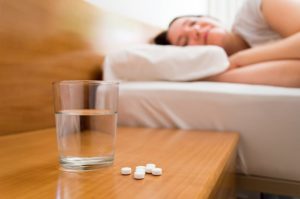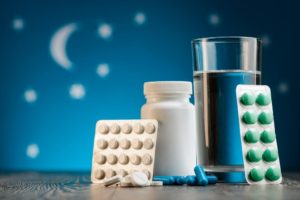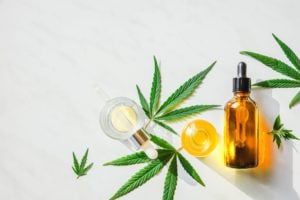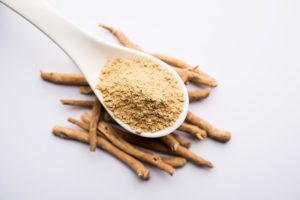When you buy through our links, we may earn a commission. Products or services may be offered by an affiliated entity. Learn more.
Gaba for Sleep
Millions of Americans struggle with sleep problems, and data from the CDC shows that over 8% of adults take sleep aids multiple times per week. Dietary supplements are one type of sleep aid, and gamma-aminobutyric acid (GABA) supplements are often advertised as a way to improve sleep.
While conclusive research about GABA supplements is limited, people with difficulty sleeping can get informed about what GABA is, how it is connected to sleep, and the potential benefits and downsides of taking GABA supplements.
What Is GABA?
Gamma-aminobutyric acid (GABA) is an amino acid that reduces the activity of brain cells. In this way, GABA helps keep the brain from becoming overwhelmed and is vital to brain health and functioning.
GABA belongs to a class of chemicals called neurotransmitters. Neurotransmitters facilitate communication between brain cells. Some neurotransmitters heighten brain activity, while others inhibit it. In the human brain, GABA is a key inhibitory neurotransmitter.
This neurotransmitter is made inside certain parts of the brain. It is created through the synthesis of another neurotransmitter called glutamate. After being produced, GABA activates specific receptors in the brain, leading to a slowing of brain activity.
Some prescription medications work by activating GABA receptors. GABA receptors are proteins on a cell that respond when GABA is released in the body. Drugs that activate GABA receptors include sleep aids and drugs to reduce seizures. Alcohol also impacts brain activity through its effects on GABA receptors.
GABA is also found naturally in many types of foods, including tomatoes, soybeans, and some teas, beans, and fermented foods. GABA is also found as a food additive in some products. However, research is mixed about whether GABA from food or supplements can reach the brain.
The brain is protected by the blood-brain barrier, which prevents many substances from entering the brain. Studies about whether GABA can cross the blood-brain barrier have had conflicting results. In addition, research about GABA in rats indicates that GABA from external sources may be quickly depleted by the body.
GABA Supplements for Sleep
GABA is normally created within cells of the brain, but it can also be produced in a laboratory or by natural fermentation. This allows GABA to be sold as a dietary supplement that can be purchased without a prescription.
Enhancing sleep and improving mood are among the many advertised benefits of GABA supplements. Supplements may include GABA alone, but many sleep-focused products combine GABA with other natural sleep aids.
While GABA made in the brain has been identified to play a role in sleep, only limited research has been conducted about the effects of GABA supplements on sleep. People interested in GABA supplements should carefully consider their potential benefits and downsides and review any questions with their health care provider.
Potential Sleep Benefits of GABA Supplements
GABA supplements may make it easier to fall asleep by helping to slow down brain activity. Although studies to date have been small, taking GABA supplements before bed has shown promise in decreasing how long it takes to fall asleep.
In one study with 40 adults with sleep difficulties, people who took oral supplements with 300 milligrams (mg) of GABA one hour before bed for four weeks showed a statistically significant reduction in the time needed to fall asleep. Similar results have been found in other limited studies with a similar design.
Although some people taking GABA reported improved sleep, this effect has not been observed consistently across studies, a difference that may relate to how long someone takes GABA supplements.
Some evidence indicates that GABA levels from supplements may rapidly decline in the body, which could explain their limited effect on sleep later in the night. At the same time, this may help avoid the problems of morning drowsiness and disrupted sleep stages that can occur with some prescription sleep medications.
In addition to helping people feel sleepy, GABA may make it easier to fall asleep by reducing anxiety. Stress and anxiety can interfere with sleep and have been associated with low levels of GABA. More research is needed to understand the role of GABA supplements in mood and mental health, but some evidence suggests that they have the potential to decrease stress.
Dosage and Timing of GABA Supplements
A small-scale study found that taking a 300 milligram (mg) dose of GABA before bed for several weeks was well-tolerated and reduced the time required to fall asleep. Evidence points to a need to take GABA supplements for at least one week to influence stress levels or sleep.
That said, there are no universal standards for the dosage and timing of GABA supplements for sleep. Because much remains unknown about the effects of GABA supplements, there is a lack of evidence about the most safe and effective dosages.
In practice, many GABA supplements have a dosage of around 100 mg, although there can be significant variation among products. There can also be differences in how the GABA is produced, which may play a role in the supplement’s effect.
In the United States, dietary supplements do not need to be approved by the Food and Drug Administration (FDA) before being sold, so there are few regulations on dosage levels for GABA supplements. One organization recommends against daily doses of GABA over 750 mg or use of GABA supplements for more than four weeks without first talking with a health professional.
Potential Side Effects of GABA Supplements
Side effects from taking GABA supplements are uncommon. At dosages typically found in supplements for sleep, patients have reported no serious unwanted effects.
Although GABA supplements can often be taken without issue, some people experience abdominal pain or headaches. At very high doses, GABA supplements can cause a brief burning feeling in the throat.
A small number of people may have persistent drowsiness from GABA supplements similar to what can occur with prescription sleeping pills. Too much GABA in the brain is also associated with disorders of excessive daytime drowsiness and non-restorative sleep.
Special precautions may be necessary before taking GABA supplements in certain situations, including for:
- People who take blood pressure medications
- People who take drugs to prevent seizures
- Pregnant people
GABA supplements are generally only marketed for adults over the age of 18, and they may have negative effects in very young children.
It is important for any individual to talk with their doctor about the potential side effects of any dietary supplements, including GABA alone or in combination with other compounds.
Tips for Optimizing the Sleep Benefits of GABA
Several practical tips may help people who are interested in seeing if GABA supplements can improve their sleep.
- Buy from reputable providers: Dietary supplement production can suffer from a lack of standardization, and some products are mislabeled or contain hidden ingredients that may pose health risks. It is best to look for established, reputable manufacturers, which may include those that submit their products for independent quality testing.
- Consult a health professional: A pharmacist or doctor may be able to answer practical questions about different products, including dosages of GABA supplements and the safety of combining GABA with other medications or supplements.
- Track dosage and outcomes: It is a good practice to keep a written record of all of a person’s medications and supplements, including the dosage and how often they are taken. When trying GABA supplements for sleep, a sleep journal can be used to keep track of daily changes in sleep patterns and the presence of any side effects.
In addition, it may be helpful to think about the range of factors that can promote better nightly sleep and may work in concert with sleep aids. Improving sleep habits may resolve problems that interfere with consistent sleep. Examples of tips to enhance sleep habits include:
- Budgeting enough hours for sleep each night
- Trying to stick to a consistent bedtime and wake-up time each day
- Avoiding caffeine and alcohol late in the day
- Reducing excess light, noise, and heat in the bedroom that may cause sleep interruptions
- Limiting screen time in the hour before going to bed
When to Talk to Your Doctor
Even though GABA supplements can be purchased without a prescription, it is still a good practice to talk with a doctor before starting to take any new drug or dietary supplement. The doctor can discuss sleep problems, the safety of different sleep aids, and any other steps that may improve sleep.
Consulting with a health professional is especially important for people who may have a higher risk of adverse reactions from GABA supplements, including pregnant people, anyone under 18 years old, and people taking medications for blood pressure or seizures.
It can also be beneficial to raise any concerns about sleep with a doctor or sleep specialist who may be able to order any necessary tests and help determine the underlying cause. A doctor should be notified if sleep problems include:
- An inability to fall asleep or stay asleep on most nights
- Significant daytime sleepiness, especially if it affects work performance or safety, including when driving
- Changes to thinking, memory, or mood
- Frequent snoring, especially if it is loud and involves gasping or choking sounds
Medical Disclaimer: The content on this page should not be taken as medical advice or used as a recommendation for any specific treatment or medication. Always consult your doctor before taking a new medication or changing your current treatment.

Still have questions? Ask our community!
Join our Sleep Care Community — a trusted hub of sleep health professionals, product specialists, and people just like you. Whether you need expert sleep advice for your insomnia or you’re searching for the perfect mattress, we’ve got you covered. Get personalized guidance from the experts who know sleep best.
References
19 Sources
-
MedlinePlus: National Library of Medicine (US). (2018, April 1). GABA-transaminase deficiency., Retrieved June 7, 2022, from
https://medlineplus.gov/genetics/condition/gaba-transaminase-deficiency/ -
Jewett, B. E., & Sharma, S. (2021, July 26). Physiology, GABA. In StatPearls. StatPearls Publishing., Retrieved June 7, 2022, from
https://www.ncbi.nlm.nih.gov/books/NBK513311/ -
Maiese, K. (2022, April). Neurotransmission. Merck Manual Professional Version., Retrieved June 7, 2022, from
https://www.merckmanuals.com/professional/neurologic-disorders/neurotransmission/neurotransmission -
Allen, M. J., & Sabir, S., Sharma, S. (2022, February 17). GABA receptor. In StatPearls. StatPearls Publishing., Retrieved June 7, 2022, from
https://www.ncbi.nlm.nih.gov/books/NBK526124/ -
Roehrs, T., & Roth, T. (2022, April 13). The effects of medications on sleep quality and sleep architecture. In Benca, R. (Ed.). UpToDate., Retrieved June 7, 2022, from
https://www.uptodate.com/contents/the-effects-of-medications-on-sleep-quality-and-sleep-architecture -
Schachter, S. C. (2022, April 25). Antiseizure medications: Mechanism of action, pharmacology, and adverse effects. In P. Garcia (Ed.). UpToDate., Retrieved June 7, 2022, from
https://www.uptodate.com/contents/antiseizure-medications-mechanism-of-action-pharmacology-and-adverse-effects -
De Leon, A. S., & Tadi, P. (2022, May 8). Biochemistry, gamma aminobutyric acid. In StatPearls. StatPearls Publishing., Retrieved June 7, 2022, from
https://www.ncbi.nlm.nih.gov/books/NBK551683/ -
Hepsomali, P., Groeger, J. A., Nishihira, J., & Scholey, A. (2020). Effects of oral gamma-aminobutyric acid (GABA) administration on stress and sleep in humans: A systematic review. Frontiers in Neuroscience, 14, 923.
https://pubmed.ncbi.nlm.nih.gov/33041752/ -
Oketch-Rabah, H. A., Madden, E. F., Roe, A. L., & Betz, J. M. (2021). United States Pharmacopeia (USP) safety review of gamma-aminobutyric acid (GABA). Nutrients, 13(8), 2742.
https://pubmed.ncbi.nlm.nih.gov/34444905/ -
Maiese, K. (2021, March). Brain. Merck Manual Consumer Version., Retrieved June 7, 2022, from
https://www.merckmanuals.com/home/brain,-spinal-cord,-and-nerve-disorders/biology-of-the-nervous-system/brain -
Boonstra, E., de Kleijn, R., Colzato, L. S., Alkemade, A., Forstmann, B. U., & Nieuwenhuis, S. (2015). Neurotransmitters as food supplements: The effects of GABA on brain and behavior. Frontiers in Psychology, 6, 1520.
https://pubmed.ncbi.nlm.nih.gov/26500584/ -
Kim, S., Jo, K., Hong, K. B., Han, S. H., & Suh, H. J. (2019). GABA and l-theanine mixture decreases sleep latency and improves NREM sleep. Pharmaceutical Biology, 57(1), 65–73.
https://pubmed.ncbi.nlm.nih.gov/30707852/ -
American Academy of Sleep Medicine. (2014). The International Classification of Sleep Disorders – Third Edition (ICSD-3). Darien, IL.
https://aasm.org/ -
Byun, J. I., Shin, Y. Y., Chung, S. E., & Shin, W. C. (2018). Safety and efficacy of gamma-aminobutyric acid from fermented rice germ in patients with insomnia symptoms: A randomized, double-blind trial. Journal of Clinical Neurology (Seoul, Korea), 14(3), 291–295.
https://pubmed.ncbi.nlm.nih.gov/29856155/ -
National Institutes of Health Office of Dietary Supplements. (2020, March 11). Background information: Dietary supplements., Retrieved June 7, 2022, from
https://ods.od.nih.gov/factsheets/DietarySupplements-Consumer/ -
National Center for Complementary and Integrative Health. (2018, December). Using dietary supplements wisely., Retrieved June 7, 2022, from
https://www.nccih.nih.gov/health/using-dietary-supplements-wisely -
National Institutes of Health Office of Dietary Supplements. (2020, September 3). Dietary supplements: What you need to know., Retrieved June 7, 2022, from
https://ods.od.nih.gov/factsheets/WYNTK-Consumer/ -
A.D.A.M. Medical Encyclopedia. (2020, April 9). Changing your sleep habits. MedlinePlus., Retrieved June 8, 2022, from
https://medlineplus.gov/ency/patientinstructions/000757.htm -
National Heart, Lung, and Blood Institute. (2011, August). Your guide to healthy sleep., Retrieved June 8, 2022, from
https://www.nhlbi.nih.gov/health-topics/all-publications-and-resources/your-guide-healthy-sleep
























